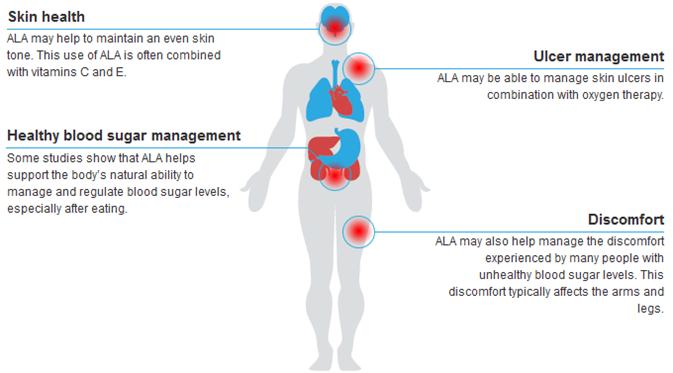Support Healthy Cell Function
Alpha Lipoic Acid Background and Benefits

Alpha-lipoic acid is an organosulfur compound biosynthesized by all animals. It is an essential component of aerobic metabolism and a cofactor in many enzymes. One of the best-known biochemical uses of alpha-lipoic acid is its role in the synthesis of the pyruvate dehydrogenase complex (PDC). This role forms the basis for its use as an antioxidant that inhibits the production of free radicals that can cause cellular damage.
Alpha-lipoic acid exists in two forms, which are chemically referred to as enantiomers: R-lipoic acid (RLA) and S-lipoic acid (SLA). RLA is the biologically active form that is widely available in many natural sources. SLA does not occur naturally and was first synthesized in 1952. Both forms of alpha lipoic acid are currently produced commercially in large quantities and with high purity.
Major dietary sources of alpha-lipoic acid include broccoli, kidney, liver, potato, spinach and yeast. Depending on the country, it is also sold as a dietary supplement or drug. For example, in the United States, alpha-lipoic acid is sold mainly as an antioxidant. In Japan, it is mainly used as an energy and weight loss supplement.
Dihydrolipoic acid is derived from the conversion of alpha-lipoic acid. Alpha lipoic acid is different from alpha-linolenic acid, which is an omega-3 fatty acid. Alpha-lipoic acid and alpha-linolenic acid, are both sometimes abbreviated as ALA creating confusion. Alpha lipoic acid is also known as lipoic acid.
Uses of alpha lipoic acid
The antioxidant properties of alpha lipoic acid provide it with many benefits. ALA is most commonly used for conditions related to unhealthy blood sugar levels. Supporting skin health and treating ulcers are also common reasons for taking ALA. It also helps treat metabolic syndrome and support a healthy immune system.

Signs that you need alpha lipoic acid
The most common reason for taking alpha lipoic acid is a pain in the arms and legs, medically known as peripheral neuropathy. The condition can cause extreme discomforts such as a burning or tingling sensation. These nerve-related signs also include numbness.
Other signs that you may benefit from alpha lipoic acid include age-related conditions, and it can help improve absent-mindedness and preserve memory.
This dietary supplement crosses the blood-brain barrier, which means it easily enters the brain. Thanks to its antioxidant properties, alpha lipoic acid supports the body's natural ability to control free radical activity. Because alpha lipoic acid can easily enter the brain, it can also support brain and nerve tissue health.
Unhealthy blood sugar levels as well as slow-healing wounds are other strong indicators that you could benefit from ALA.






